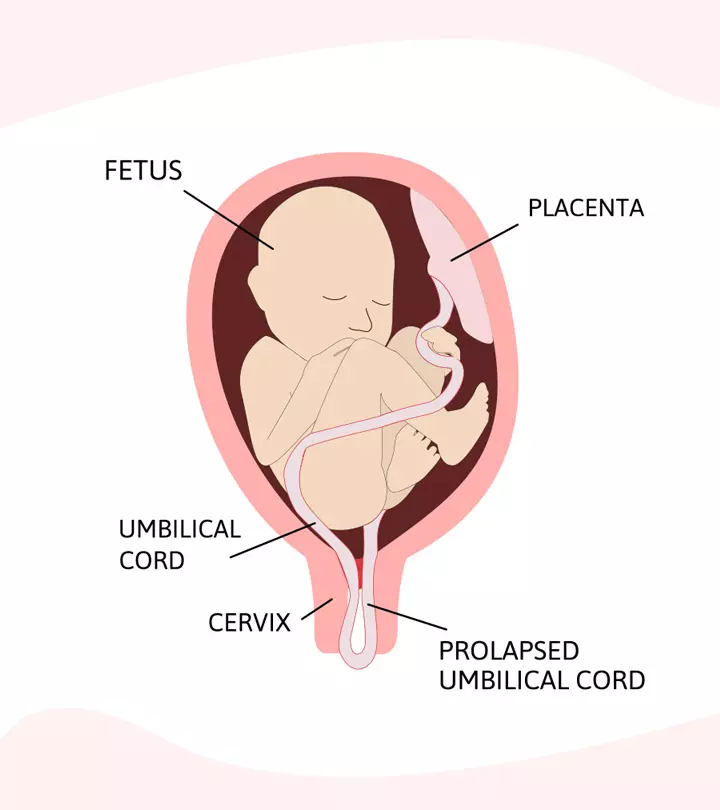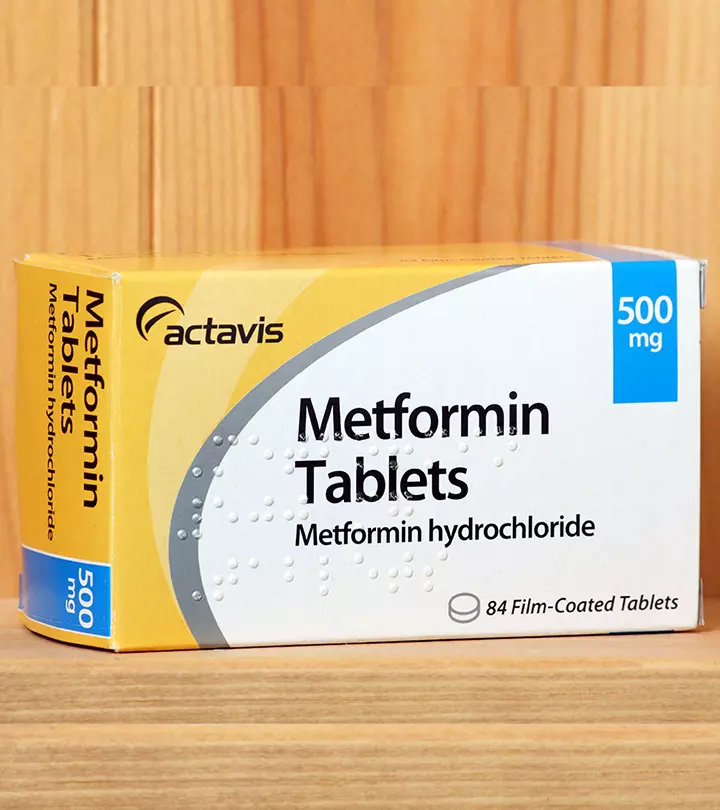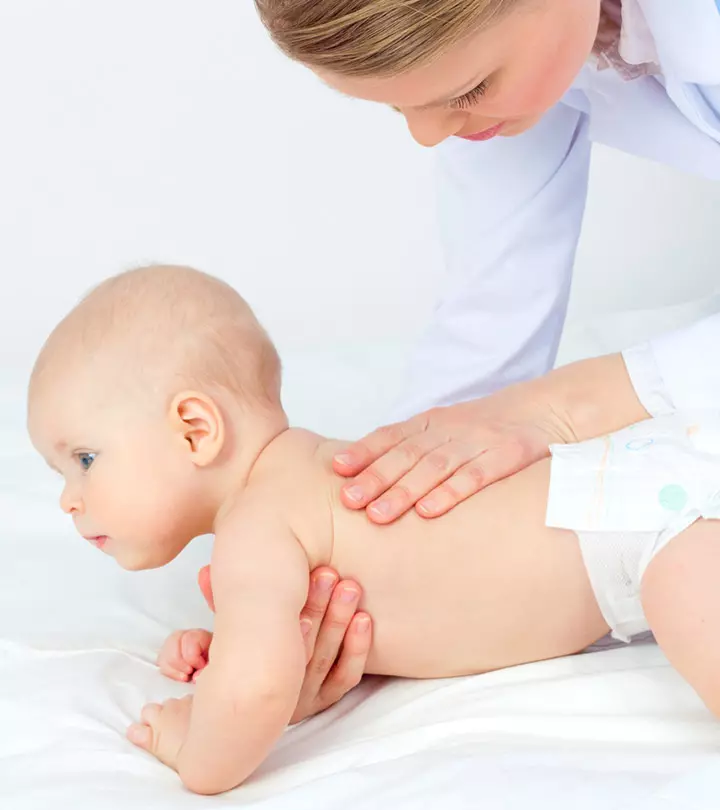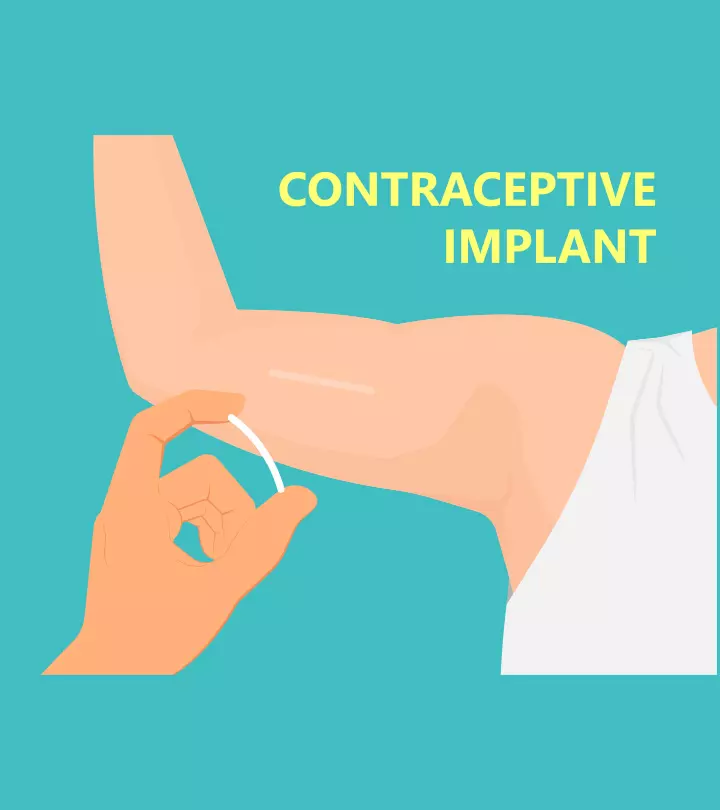
Image: Shutterstock
The process of eruption of milk teeth is called teething. While the teething process follows a set pattern, it is not uncommon to see late teething in babies. The exact cause behind it is usually not always known. Nevertheless, most late teething cases are benign and do not need any intervention. Your pediatric dentist can help you rule out any other conditions that may require treatment. Read this post to learn more about the causes and complications of late teething and when to see a doctor for it.

Key Pointers
- A baby is said to be experiencing late teething or delayed teething when their teeth do not emerge within the typical age range.
- The delayed emergence of teeth does not always indicate a problem since some babies have late teething with no underlying issues.
- Malnutrition, hormonal problems, and thyroid disorders are a few severe problems that may cause late teething in some babies.
Normal Teething Chart For Babies

It is essential to understand normal teething patterns in babies to determine delayed teething. The first teeth to erupt in your baby’s mouth are the lower front teeth, and they do so around six months of age. The upper front teeth are the next, followed by other teeth that emerge within their respective age range (1).
| Lower Teeth | Upper Teeth |
|---|---|
| Central incisor: 6-10 months | Central incisor: 8-12 months |
| Lateral incisor: 10-16 months | Lateral incisor: 9-13 months |
| First molar: 14-18 months | First molar: 13-19 months |
| Canine: 17-23 months | Canine: 16-22 months |
| Second molar: 23-31 months | Second molar: 25-33 months |
What Is Delayed Teething?
Teething is defined as the process of primary teeth eruption from the gums (2). If the teeth do not erupt during the usual age range or there is a significant deviation from their expected time of eruption, then the baby is considered to be experiencing delayed teething (3).
Several signs and symptoms accompany the process of a tooth’s eruption. Babies with delayed tooth eruption also display delayed teething symptoms.
Should You Be Concerned If Your Baby Starts Teething Late?
According to the Australian Dental Association, some babies may begin teething at an early age of four months, while some may start teething as late as ten months (1). There is usually no need to be concerned if your baby experiences delayed dental development.
Each baby achieves developmental milestones at a different age, and it is the same with teething. A baby can achieve teeth eruption at any age within the specified age range. Therefore, you may wait since the baby could eventually experience teething on attaining the upper limit of the age range.
When To Consult A Doctor?

According to Edward Moody, D.D.S., the former president of the American Academy of Pediatric Dentistry (AAPD), “Teething typically begins when a baby is between six and eight months old, although some children don’t have their first tooth until 12 to 14 months.” He further emphasizes on taking a baby to a pediatric dentist by one year of age to be well-informed about dental health care for babies (4).
So, if your baby’s first teeth (lower central incisors) do not erupt even after the age of 12 months, see a pediatric dentist. Some babies are late bloomers and experience delayed teething for no specific reason. However, in some cases, delayed teething may occur due to underlying problems, which require diagnosis and treatment.
Other developmental milestones may not be related to teething; thus, do not wait for your baby to achieve dental milestones with others before taking them to a dentist (5).
What Causes Late Teething In Babies?
The following conditions may cause delayed teething in babies. Some of the reasons are pathological abnormalitiesiAbnormality in structural or functional aspects of the body’s tissues or organs. and may require treatment to commence teething.
1. Hereditary factors
If you or your partner had similar late teething issues at the same age, it could likely be that your baby experiences similar issues. Similarly, the genetic makeup or ethnicity of the couple can also influence tooth eruption in babies (6).
2. Poor nutrition

Studies have shown that low birth weight, poor nutritional status, or nutritional insufficiency can affect teeth eruption (7). According to the Centers for Disease Control and Prevention, the percentage of babies born with low birth weight in the United States is 8.52% (8). The nutritional status of the body influences teeth in their pre-eruptive phase. Any deficiency in calcium and the vitamins D, C, B, and A can significantly impact your baby’s teething (9).
3. Thyroid disorders
Babies with thyroid disorders, especially hypothyroidismiA condition caused due to thyroid gland's inability to produce sufficient amounts of thyroid hormone. , could have delayed teeth eruption. If they have any existing teeth, they may also have other dental problems, such as enamel hypoplasiaiTooth abnormality that leads to reduced enamel (covering of the tooth crown) production. , open-bitesiA dental condition where the top and bottom teeth do not meet when the mouth is closed. , or cross-bites (6).
4. Fibrosis
Fibrosis is a condition characterized by thick gums that impede or prevent the teeth from erupting. This could cause a delay in teeth eruption in some babies (11).
5. Hormonal issues
Problems in the secretion of the growth hormone, a hormone released by the pituitary gland, may significantly affect the development of facial structures, including the eruption of teeth. Hypopituitarism is one of the conditions that can cause the pituitary gland to secrete low levels of the growth hormone, leading to delayed teething, among other problems (12).
6. Systemic diseases and medication
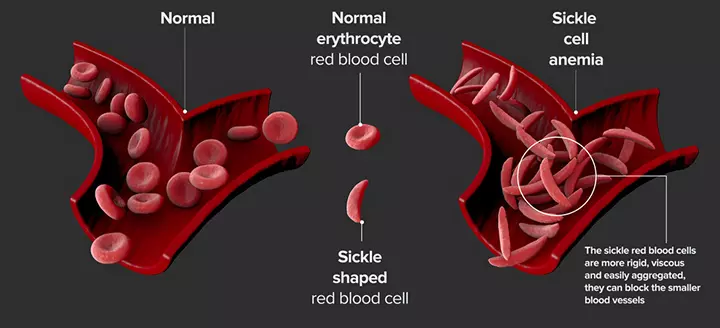
Many systemic disorders, such as iron-deficiency anemia and sickle-cell anemiaiA genetic disorder characterized by abnormally shaped red bed cells and low levels of hemoglobin. , may delay teething(13). Certain long-term medications may also interfere with tooth eruption.
7. Injuries
Any trauma to the jaw could affect the tooth buds and delay teething (14). Injuries may also lead to fibrosis, which also causes delayed teething.
8. Impacted teeth
Milk teeth may also become impacted like permanent teeth. An impacted milk tooth may fail to erupt and stay lodged within the jaw or gums. A baby with impacted teeth is likely to experience other signs and symptoms, such as gum redness, gum swelling, and pain (15).
9. Absent or missing teeth
In rare cases, a baby may have a missing tooth, which could be mistaken for delayed teething (16).
10. Genetic disorders
Genetic conditions, such as amelogenesis imperfectaiA rare genetic and developmental disorder indicated by abnormal enamel formation. and dentinogenesis imperfectaiA rare genetic disease characterized by discoloration of teeth. , may affect the baby’s teeth and gums, increasing the risk of delayed teething (17). Premature babies may also be at risk of experiencing delayed dental development due to genetic reasons (7).
As a mother, Ananya Sri shares in her blog her premature-born son’s delayed teething journey. She says, “Anyway, it has been 1 year and 3 months since our son was born and still no sign of a tooth. “Finally, something that we should have done a long-long time ago, we decided to ask my very renowned dentist aunty from Hong Kong. She informed us that the calcification of teeth happens in the third trimester of fetal development and since Aarav was 2 months early, it means it is obvious that there will be a delay. She also warned us not to give too much calcium which we had halved over time to 5 ml daily because excessive calcium can lead to kidney stones. And then after months of rubbing my clean fingers on his gum to look for sharpness / hardness, my sister, Saumya finally spotted 3 mini teeth in Aarav’s gums (i)!!”
Certain genetic disorders could affect the musculoskeletal growth of the body, affecting even the eruption of the teeth. Some genetic disorders associated with delayed teething are Down syndrome, Turner syndrome, Gardner syndrome, Hutchinson-Gilbert syndrome (Progeria)iA rare genetic condition marked by accelerated aging. , and Bloch–Sulzberger syndromeiAn uncommon genetic disorder affecting several organs, including the eyes, skin, teeth, and central nervous system. (17). A baby with these disorders is likely to experience other significant symptoms as well.
 Quick fact
Quick factComplications Of Delayed Teething
Complications of delayed teething may depend on the underlying reason. Delayed teething due to no apparent reasons or due to benign reasons may not lead to complications.
In some cases, delayed teething may cause the following complications.
- Jaw bone deformity and asymmetrical face: Delayed teething also causes a delay in permanent teeth eruption. This leads to misalignment of jaws leading to long-term issues, such as an asymmetrical face. This complication may usually arise in babies who experience delayed teething due to severe problems, such as genetic disorders.
- Delay in chewing food: A delay in the emergence of primary teeth could delay the age at which you add solid food to your baby’s diet. It could cause a delay in learning how to chew solid food. Inability to eat solid food may increase the risk of other issues, such as malnutrition.
- Formation of cysts: Impacted or embedded teeth increase the risk of developing a cyst around them. It could cause intense pain and may require surgical intervention.
- Crowded permanent teeth: Primary teeth work as placeholders for permanent teeth. Any issues in primary teeth could also impact permanent teeth. The untimely eruption of primary teeth may interfere with the eruption of permanent teeth, affecting their alignment or causing them to become impacted.
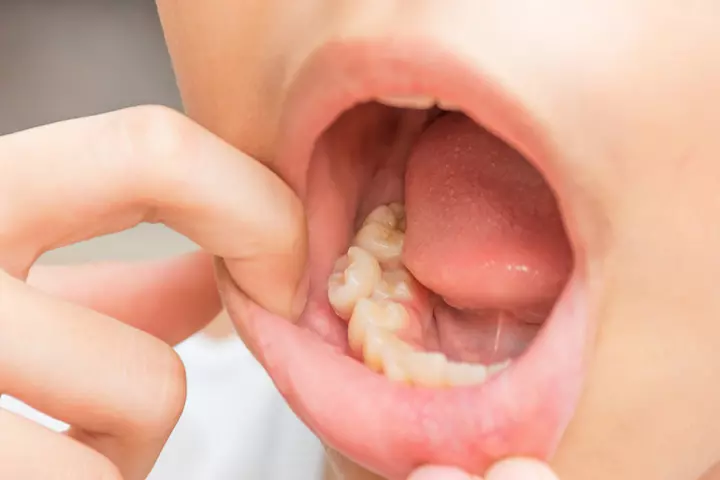
 Point to consider
Point to considerWhat To Do If Your Baby’s Teething Is Delayed?
Although there is no treatment for delayed tooth eruption in babies, you may follow these tips if you think your baby has delayed teething (18):
- Observe your baby for any signs of development delay indicating underlying diseases or illnesses.
- Massage baby’s gums to help in tooth eruption by stimulating blood circulation in gums.
- Give them safe and soft teething toys and chilled teething rings to chew.
- Ensure proper nutrition in the baby’s diet, including foods rich in phosphorus, calcium, vitamin D, iron, fluoride, protein, and vitamin K.
- Contact your baby’s dentist if the first tooth eruption did not occur even after 12 months.
Frequently Asked Questions
1. How can I make my baby’s teeth come faster?
The teething process could be innately fast or slow among babies. There are no definitive ways of making a baby’s teeth come faster. If you feel your baby’s teeth are coming slowly, speak to a pediatric dentist.
2. How many teeth should a one-year-old have?
According to the American Academy of Pediatrics, most babies may develop at least one tooth until their first birthday. However, some might not have any as well (21).
3. Does a pacifier cause a delay in teething?
A pacifier is generally safe for children and does not lead to delayed teething (22). However, using dirty pacifiers or their improper or excessive use may cause infections and injuries leading to tooth decay, misaligned teeth, and other oral health problems in later stages of the child’s life (23) (24).
4. Does teething begin late in breastfed babies?
According to Dallas-based dental specialist Dr. Vishala Patel, “Breastfeeding can sometimes influence the timing of teething, but research indicates that it does not significantly delay teething. It’s also normal for baby teeth to emerge out of order; this is typically not a cause for concern.”
If your baby hasn’t grown their teeth, do not hit the panic button, as late teething in babies is not uncommon. Remember, baby teething can vary among infants. Since babies develop at their own pace, a few may show signs of delayed teething. Late or delayed teething could hinder a baby’s nutritional intake and affect their overall growth and development. Hence, determining the precise cause of the delay is essential. The delayed tooth growth could be benign, but sometimes it may call for medical attention. Hence, be patient and consult a doctor if they do not grow teeth even after they are 12 months old.
Infographic: Common Misconceptions About Delayed Teething
Late teething is common in some babies and is not always a reason to worry. In such cases, it is crucial not to believe in non-scientific misconceptions, as this infographic mentions. Seek a pediatrician or pediatric dentist’s advice to understand the underlying reasons and solutions for delayed teething.
Some thing wrong with infographic shortcode. please verify shortcode syntax
Illustration: Late Teething In Babies: 10 Reasons And Complications
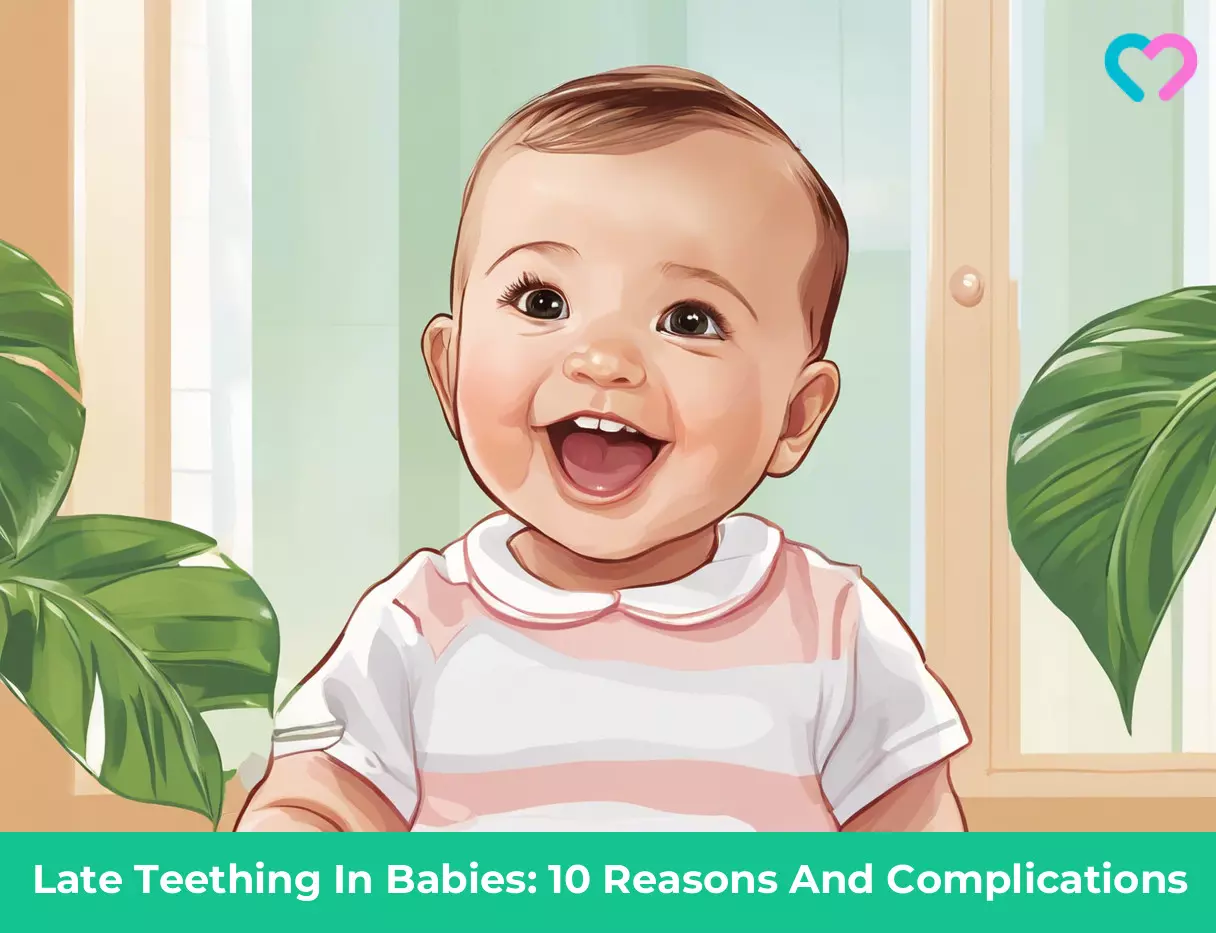
Image: Stable Diffusion/MomJunction Design Team
Personal Experience: Source
MomJunction articles include first-hand experiences to provide you with better insights through real-life narratives. Here are the sources of personal accounts referenced in this article.
i. Thoughts of parents : New teeth or no teeth;https://medium.com/inking-my-mind/thoughts-of-parents-new-teeth-or-no-teeth-d61ce5162363
References
1. Teething chart; Australian Dental Association
2. Teething; Stanford Children’s Health
3. Dental health for children; The Royal Children’s Hospital Melbourne
4. Teething 101: Tips from a Dentist and Dad; American Academy of Pediatric Dentistry
5. Neha Verma et al., Effect of Developmental Milestones on Patterns of Teeth Eruption; International Journal of Scientific Study
6. Fernando Ramirez Rozzi;Diversity in tooth eruption and life history in humans: illustration from a Pygmy population; Scientific reports; NCBI
7. Caio L B Reis et al.;Nutritional Status is Associated with Permanent Tooth Eruption in a Group of Brazilian School Children; Global Pediatric Health; NCBI
8. Birthweight and Gestation; CDC
9. AparnaSheetal et al., Malnutrition and its Oral Outcome – A Review; Journal of Clinical & Diagnostic Research; NCBI
10. S Vucic et al., Thyroid Function during Early Life and Dental Development; NCBI
11. Gingiva Fibromatosis; ScienceDirect
12. Gaurav Atreja et al., Oral manifestations in growth hormone disorders; Indian Journal of Endocrinology and Metabolism; NCBI
13. Caroline Maria Igrejas Lopes et al., Enamel defects and tooth eruption disturbances in children with sickle cell anemia; NCBI
14. Lucía Caeiro-Villasenín et al.;Developmental Dental Defects in Permanent Teeth Resulting from Trauma in Primary Dentition: A Systematic Review; International journal of environmental research and public health; NCBI
15. Impacted tooth; Medline Plus
16. Teething: Common Concerns; C.S. Mott Children’s Hospital
17. C. Choukroune, Tooth eruption disorders associated with systemic and genetic diseases; Journal of Dentofacial Anomalies and Orthodontics
18. How Can I Stimulate My Baby’s Teeth To Grow? (Healthy Teeth Growth); CDHP Dental Health Project
19. Nagarathna C et al.;Cleidocranial dysplasia presenting with retained deciduous teeth in a 15-year-old girl: a case report; Journal of Medical Case Reports
20. Speech Problems; Nemours Children’s Health
21. Baby’s First Tooth: 7 Facts Parents Should Know; American Academy of Pediatrics
22. Pacifiers (soothers): A user’s guide for parents/a>; NCBI
23. Using Pacifiers Safely; U.S. Department of Health and Human Services
24. The Effects of Extended Pacifier Use by Infants; Sensory Solutions
Community Experiences
Join the conversation and become a part of our nurturing community! Share your stories, experiences, and insights to connect with fellow parents.
Read full bio of Dr. Tazeen Raees
- Dr. Vishala Patel specializes in comprehensive dental care, including the intricacies of pediatric dentistry. Her training at the University of Michigan School of Dentistry provided a solid foundation in dental sciences and the nuances of dental development in children.
 Dr. Vishala Patel specializes in comprehensive dental care, including the intricacies of pediatric dentistry. Her training at the University of Michigan School of Dentistry provided a solid foundation in dental sciences and the nuances of dental development in children.
Dr. Vishala Patel specializes in comprehensive dental care, including the intricacies of pediatric dentistry. Her training at the University of Michigan School of Dentistry provided a solid foundation in dental sciences and the nuances of dental development in children.
Read full bio of Dr. Meenakshi Maruwada
Read full bio of Rohit Garoo
Read full bio of Anindita Ghatak







